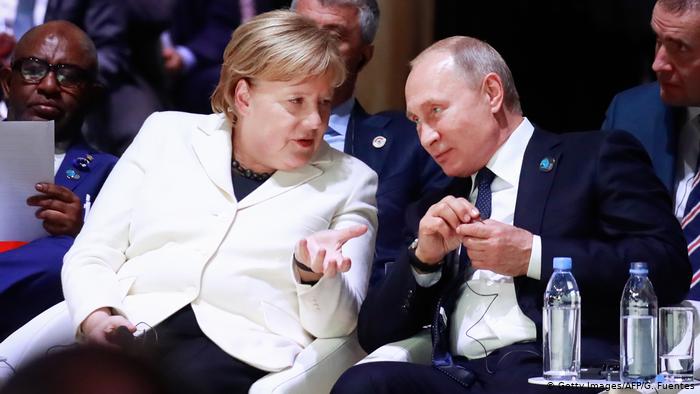
German Chancellor Angela Merkel will meet with Russian President Vladimir Putin next week, a government spokesperson confirmed on Friday, with the murder of Georgian activist Zelimkhan Khangoshvili at the center of a diplomatic dispute between the two nations.
The meeting is set to take place in Paris on Monday ahead of a summit on Ukraine hosted by French President Emmanuel Macron.
Chancellor Merkel also plans to hold one-to-one talks with Ukrainian counterpart, Volodymyr Zelensky.
Germany-Russia tensions rise
Speaking at the NATO summit in London earlier this week, Merkel was critical of Moscow over the murder of the 40-year-old Georgian.
Khankoshvilli was shot and killed at point-blank range by a cyclist in broad daylight at a park in Berlin's Kleiner Tiergarten on August 23.
The ethnic Chechen had fought against Russia in the Second Chechen War and was linked to Georgian military intelligence.
Also this week, Germany's attorney general took control of the investigation, saying there was enough evidence to suggest "state actors" in Russia or Chechnya were behind the shooting.
Diplomats expelled, Moscow outraged
The Foreign Ministry on Wednesday expelled two Russian diplomats, and Merkel said the decision was based on the lack of cooperation over the murder.
On Friday, Merkel's chief of staff, Helge Braun, admitted he was dismayed at the furious reaction from Moscow over the expulsions. Earlier, Russia's ambassador to Germany dismissed the accusations of involvement in the murder while also threatening consequences for expulsions.
But Braun told Der Spiegel news magazine: "We see the expulsions as an extremely urgent signal to the Russians to comprehensively support us in establishing the identity and personal background of the suspected perpetrator."
He added: "Against the backdrop over months of a lack of support, I have no understanding for the fact that Russia is outraged and is considering countermeasures."
Russian suspect in custody
A 49-year-old man with a Russian passport was arrested as he fled the murder scene in the German capital. The suspect, also implicated in the murder of a Russian businessman in 2013, has, thus far, maintained his right to keep silent.
Until now, the Kremlin has been reluctant to aid investigations — "despite repeated calls to do so from high-ranking German officials," according to the German Foreign Ministry.
An investigation by Bellingcat published on Friday revealed that the suspected assassin was probably a member of one of Russia's Federal Security Service's (FSB) spetznaz units. It found evidence that he was recruited as a hit man as he faced the prospect of multiple charges, which would be expunged if he agreed, a reportedly common method of recruitment for extraterritorial assassinations.